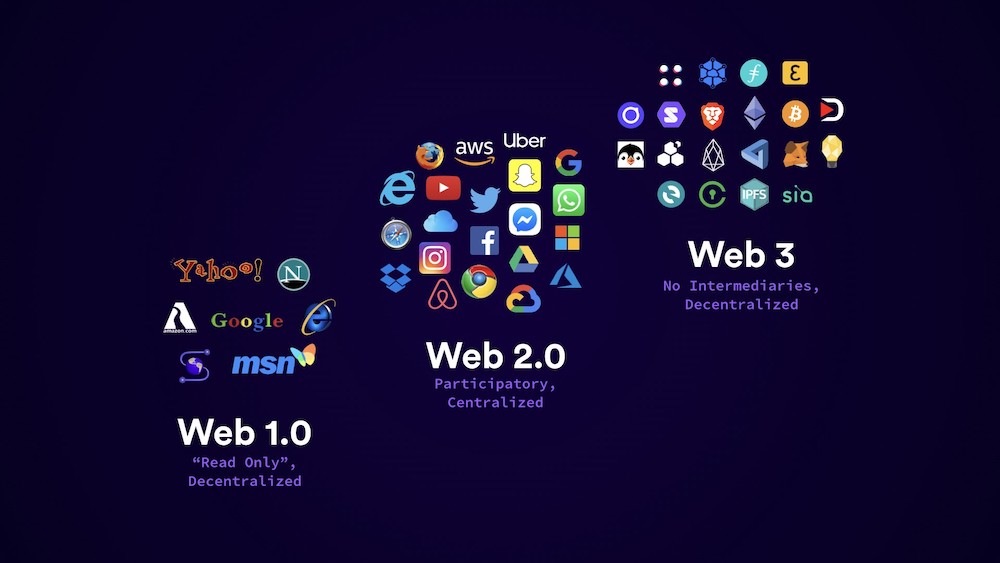The Metaverse: Hype or real, and which companies are making the early moves?

Pic: Justin Paget / DigitalVision via Getty Images
It’s said to be the next evolution of the internet, and in recent weeks, the buzz around Metaverse has taken the world by storm after Facebook announced its rebranding to Meta.
Google searches for “metaverse stock” have increased by 17,900% compared to this time last year, according to research by IG.
In an 11-minute video released to the world, Mark Zuckerberg detailed his ambitious plan to “build the metaverse”, a still vague virtual reality concept that he said could become the successor to the internet.
“One day, you’re going to able to do almost anything you can imagine,” Zuckerberg proclaimed.
But what is the metaverse, and how could investors get in on it ?
First of all, despite all the hype, the idea itself isn’t new.
The term was first coined in a 1992 science fiction novel ‘Snow Crash’ by Neal Stephenson, in which he wrote about lifelike avatars mingling in realistic 3D settings.
Stephenson’s idea has since been adapted to other books, as well as in box-office titles like Minority Report, Ready Player One, and Avatar.
Different companies have their own vision of what a metaverse would look like but at the core, it revolves around the creation of a virtual 3D environment where people could spend time in.
Multiple technologies are collaboratively being used as building blocks to create the metaverse, including virtual reality (VR), augmented reality (AR), artificial intelligence (AI), and even blockchain technology.
The earliest adopter of the concept is probably Second Life, an app in the early 2000s that allowed people to create an avatar for themselves and have a ‘second life’ in an online virtual world.
Second Life was arguably the internet’s first attempt at what Facebook and other companies are trying to do now, before it died a slow death over the last few years.
But the metaverse of the future would be more than just a platform to socialise or play games in. It would transform how people gather together at work, conferences or even shop – in what Zuckerberg envisions as “endless new playgrounds for everyone”.
Experts have also predicted the metaverse will run alongside or become part of Web 3.0, a blockchain powered internet that could be the successor to the current Web 2.0 internet.
Metaverse vs Web 3.0
Everybody is suddenly talking about Web 3 when the discussion around metaverse is brought up.
The concept of a Web 3 is still vague, but it basically refers to a potential new iteration of the internet that runs on public blockchains.
While Web 2 is the version of the internet that most of us know today, Web 3 aims to democratise the internet by giving back power to the user.
It will eliminate the big middlemen of the internet, which means you would no longer have to log onto the likes of Facebook or Google.
Instead of giving away our privacy to these tech giants, we can exist on the internet through a decentralised mesh of computers that combine to become one big distributed data centre – much like what a crypto coin does right now, really.
Some say the metaverse will have to exist within the Web 3, which means that no one company (not even Facebook) can lay claim to owning our virtual avatar data.
“Ultimately, the metaverse will allow us to play games, shop, trade, chat, work or even attend concerts, but not in a closed loop system,” says Marcel Liu, one of the ex-developers at Second Life.
“This means the current status quo is set be disrupted with the coming of the metaverse and Web 3, a huge opportunity for both new and existing tech players.”

Which companies are ahead of the game?
After Facebook, perhaps the biggest company evangelising for the metaverse is Epic Games.
Epic Games is the company behind current worldwide hit Fortnite, the survival game (and bane of parents’ lives across the globe) where 100 players drop onto an island and fight to be the last player standing.
The game has gained 350 million users worldwide and racked up US$5bn in revenue in 2020.
“Over the coming decades, the metaverse has the potential to become a multitrillion-dollar part of the world economy,” Epic Games CEO Tim Sweeney said at a conference in Seoul last week.
“It’s kind of a race to get to a billion users. Whoever brings on a billion users first would be the presumed leader in setting the standards, and the next three years will be critical in achieving that,” he continued.
Games and social media are indeed the two segments moving faster than everybody else in evolving towards the first true metaverse.
Roblox (NASDAQ:RBLX) is said to be the closest thing to an existing social metaverse today.
Listed in March, Roblox offers unique virtual experiences like music concerts.
Just last week, the platform organised a virtual concert experience dubbed World Party, EDC Las Vegas 2021. Its 43 million users can also use Robux, a digital currency created by the company.
But there are also non-meta companies jumping onto the metaverse trend.
Nike is using the Roblox platform to create its own virtual world, Nikeland. Gucci and Louise Vuitton are also positioning themselves into the virtual world, a pivot that experts said could create a US$50bn market in the virtual fashion industry.
Real estate is also booming in the metaverse.
A plot of digital land has just sold for a record $2.43 million worth of cryptocurrency in Decentraland, a decentralised 3D virtual reality platform that consists of 90,601 parcels of land.
NVIDIA, Qualcomm and Apple are also some of the leading companies building the infrastructure technology like microchips and payments around the metaverse. Not to mention Oculus VR, the leading manufacturer of those VR headsets.
On the enterprise side, Microsoft is the clear leader within the professional metaverse space.
CEO Satya Nadella told Harvard Business Review recently that “the metaverse could completely revolutionise the way professionals meet, collaborate and interact online, using avatars or even holograms.”
ASX listed Vection Tech leads enterprise metaverse
This week, Vection Tech (ASX:VR1) unveiled its FrameS Metaverse release, as part of its app integration with Webex by Cisco.
The new features will enable organisations to autonomously build immersive metaverses, dynamic 3D worlds where people can participate in meetings from anywhere in the world.
These 3D settings will be embedded to the WebEx by Cisco platform, the leading solution for video conferencing with over 590 million monthly participants.
Vection is one of the first ASX companies to capitalise on this opportunity, using its proven XR (Expanded Reality) capabilities.
“We already had conversations with Cisco way before before the whole Metaverse conversation really took place in the market,” Vection’s COO Gianmarco Orgnoni told Stockhead.
“The key feature that we’ve been developing for WebEx is essentially self-contained metaverses where people within an organisation can join and collaborate together in a virtual or digital 3D virtual environment world.”
Orgnoni explained that in online meetings currently, people would use a software like PowerPoint, a very static and outdated way of making a presentation.
“You’re just seeing these little icons of other people on the screen, but this is not engaging and you’re not really collaborating together on the same scenario,” Orgnoni explained.
“So you can think of our FrameS Metaverse as the next generation of PowerPoint, where you can be in the same space and collaborate in a 3D environment with 3D models.”
Orgnoni believes the metaverse is a technology that enterprises simply cannot ignore, citing global consultant Accenture’s recent purchase of 60,000 Oculus Quest headsets for its employees.
“Imagine the cost savings on training and efficiencies that you can create by maintaining just one virtual environment that everybody can join and train in; that’s really mind boggling.”
Orgnoni agrees that social and gaming will be the fastest adopters in the metaverse, which he said will bolster the need for collaboration within and between organisations.
“Because of this, I think the enterprise space is the one that’s going to have the most significant growth within the metaverse out of all of them,” he said.
Other ASX stocks engaging in metaverse
Gaming company Playside Studios (ASX:PLY) is making plans to build a dedicated research and development team to pursue opportunities in the metaverse space.
The company said with blockchain gaming now very much linked to the metaverse, it will look to ensure it’s at the forefront of blockchain gaming globally.
Another games company, iCandy Interactive (ASX:ICI), has launched itself into the metaverse world by acquiring 100% of shares in Lemon Sky Studios last week.
Lemon Sky Studios has established itself as a leading studio in the Southeast Asia region, with a portfolio of AAA game titles verging on the metaverse.
In that context, iCandy’s acquisition gives it a leading position in the AAA market, at a point where global gamers, marketers and game developers are building solutions for the online ‘metaverse’.
Aerial mapping company Aeoremterex (ASX:AMX) is already mapping the metaverse.
Last month, US-based Terrestrial Software Development bought the data licence to Aerometrex’s very high-resolution 3D model of the city of San Francisco, for a contract value of $250k.
Aerometrex’s 3D modelling services provide a virtual digital 3D model or map of a particular area of interest.
These virtual models provide a digital 3D map of 2cm pixel resolution, and are used by a wide variety of businesses, including real estate and transport companies.
Share prices today:
At Stockhead we tell it like it is. While Playside Studios and iCandy Interactive are Stockhead advertisers, they did not sponsor this article.
Related Topics
UNLOCK INSIGHTS
Discover the untold stories of emerging ASX stocks.
Daily news and expert analysis, it's free to subscribe.
By proceeding, you confirm you understand that we handle personal information in accordance with our Privacy Policy.








